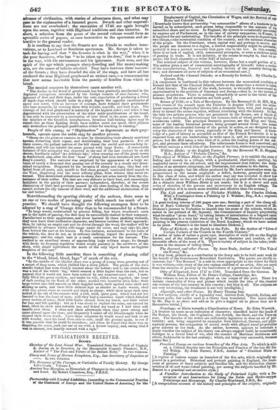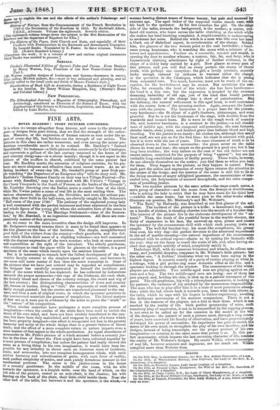PUBLICATIONS RECEIVED.
Booms.
Sketches of the Last Naval War. Translated from the French of Ca
E. Jurien de is Gravisre, by the Honourable Captain Plunkett, .N., Author of " The Past and Future of the British Navy." In two volumes. Diary and Notes of Horace Templeton, Esq., late Secretary of Legation at —. In two volumes.
The Romance of the Peerage, or Curiosities of Family History. By George Lillie Craik. Volume I.
Ancient Sea-Margins, as Memorials of Changes in the relative Level of Sea and Land. By Robert Chambers, Esq., F.R.S.E.
Partneraltiparith Limited Liabilities, (according to the Commercial Practice of the Oentinent of Europe and the United States of America,) for the
Employment of Capital, the Circulation of Wages, and the Revival of our Home and Colonial Trade.
[Everybody knows that partnership "en commandite" allows of a business to be carried on by subscription, each person being responsible to the amount of la, subscribed share and no more. In England, the system is occasionally permitted by express act of Parliament, as in the case of railway companies; in Franoe, it is legalized for any undertaking. The benefits of the principle seem to depend ape, two things,—the economical condition of the country, and the national character of the people. On the Continent, where capital was and perhaps is scare; and the people are timorous to a degree, a limited responsibility might be advisable; probably it was a natural necessity that gave rise to the law. In this eountry, there is no lack of capital, skill, commercial enterprise, or even a reckless spirit of gaming in trade. It is not industry, or the means to employ it, that we re- quire; but fresh channels—a wider field of industry. The nominal subject of this volume, however, forms but a small portion of it The anther gives a sort of commercial autobiography of himself; takes a review of the manufacturing, financial, and trading history of the country during ma war; and discusses all sorts of subjects of an economical cast.] Ireland and the Channel Islands; or a Remedy for Ireland. By Charles le Quesne, Esq. [A comparison is instituted in this volume between the economical condition of Ireland and that of the Channel Islands, while at the same time a review is team of Irish history. The object of the work, however, is virtually to recommend an approximation to the practice of Guernsey and Jersey,—that is, to the system of peasant proprietors. There is nothing remarkable or novel in the views of rho volume; but the tone and intention are both good.] Scenes of 1792; or a Tale of Revolution. By the Reverend G. D. Hill, au. [The events of the assault upon the Tuileries in August 1792 and the nue. Anent massacres of September thrown into a dramatic form, with just enough of story to thread the scenes together, without interfering with the history. In met; the only two private persons who are prominent in the Scenes, are a Garde du Corps and a workman, Revolutionary but humane, both of whom perish under me murderous rabble. The principal dramatis persona; are the King and Queen, some of the leading historical persons being grouped around them: the seems either exhibit the recorded history of theperiod in action, or are designed to de. velop the character of the actors, especially of the King and Queen. A knew. ledge of a part of history so accessible as that of the French Revolution is to be expected from any one undertaking to write upon it, and its possession is smell praise; but Mr. Hill takes a true view of it, seizes the leading points of the sub. ject, and presents them effectively. The unfortunate Louis is well conceived; and the whole conveys a vivid idea of the horrors of the time, without being too horrid.] William Blake; or the English Farmer. By the Reverend W. E. Heygete,
M.A., Author of " Probauo Clerics," Sec.
[The object of William Blake, or the English Farmer, is to exhibit the state of feeling and morals in a village, 'with a goodnatured, charitable, sporting, but neglectful rector of the old school, and the improvement that follows the minis_ trance of an attentive clergyman, not Tractarian, but zealous in his duties. Tao incidents are simple; but the effects produced by Mr. Lee's ministration seem die. proportioned to the means employed: a defect, however, generally met with In this class of tales, and which the author may say was intended to show how little is sufficient on the part of a clergyman to produce good effects in his parish. As a didactic story William Blake is not much; but it is a clever and quiet series of sketches of the persons and occurrences in an English village. The worldly portion of it is much more truthful and effective than the serious.]
The Life and Adventures of Nicholas Nielekby. By Charles Dickens, With a Frontispiece from a Painting by T. Webster, Esq., RA.; engraved by T. Williams. [A good-looking volume of 500 pages save one; forming a part of the cheap edi- tion of Bois Collected Works. The preface contains a short account of Mr. Dickens's journey to Yorkshire to inquire into the state of the schools, which re- sulted in the portrait of Mr. Squeeze; the Commissioner of Inquiry perpetrating what he calks "pious fraud," by taking letters of introduction in a feigned name. The frontispiece is a very fair wood-cut by T. Williams, from Webster's excellent painting in the present exhibition of the Boyd Academy, which we have notieed in its place. Webster's is the hand to illustrate Dickens.] Tales of Kirbeck; or the Parish in the Fells. By the Author of "Lives of Certain Fathers of the Church in the Fourth Century." [A series of tales of rather a grave cast, descriptive of rural life on the English border, and of the influence of religion upon character and comfort, or the miserable effects of the want of it. There is variety of subject in the tales; troth- fulnees in the manner of telling them.] The Rescued, and other Poems. By Anne Beak, Author of " The Tale of the Fowey," &c. [A tiny book, printed as a contribution to the fancy sale to be held next week for the benefit of the Governesses Benevolent Institution. The poems are chiefly oc- casional; but " The Rescued " is a tale in verse appropriate to the object for which it was written,—the story of the two orphan children of an artist, who are saved from the miseries of poverty by the benevolence of a patroness of their father.] Odes of Kkpstock, from 1747 to 1780. Translated from the German. By William Hind, Fellow of St. Peter's College, Cambridge, &c. [This volume is not so much the ghost as the corpse of the past. There is a certain classicality of form and phrase which recalls the idea of the classical ode-writers of the last century in this country; but that is all. The subjects au not very interesting, the treatment is not very intelligible.] Algarsije, and other Poems. By Henry Thomas Day. [A few subjects, chiefly of a legendary cast, derived from Spanish, Italiau, and German poets, but rather used as a theme than translated. The metre chosen by Mr. Day is so short and odd as to give a doggrel air to pieces that are in themselves trivial.]
Nasology; or Hints towards a Classification of Noses. By Eden Warwick. [A treatise on noses as an indication of character; classified under the heads of the Roman, the Greek, the Cogitative, the Jewish, the Snub, and the Torn-up nose. The theories of the writer are sufficiently ingenious to wear an air of pro- bability; and, being supported by examples from historical, literary, and philo- sophical persons, the comparison of actual deeds with alleged nasal propensities gives interest to the book. As the author, however, appears to entertain a doubt whether the subject of his theory can always support itself, he occasionally indulges in a forced kind of wit, after the manner of Martinis Scriblerus and others, fashionable in the last century; which, not being very successful, becomes rather flat.]
Practical Essays on various branches of the Fine Arts. To which is add- ed, a Critical Inquiry into the Principles and Practice of the late Sir Da- vid Wilkie. By John Barnet, F.R.S., Author of " Practical Hints on Painting." [A reprint of various essays on branches of the fine art; which originally ap- peared in a periodical. Historical and portrait painting in England, the treat- ment of pictures of fancy subjects and familiar life, and the distinctive chance teristics of oil and water-colour painting, are among the subjects handled by Mr. Burnet in a practical and attractive style.] A Familiar Introduction to the Study of Polarized Light; with a De- scription of and Instructions for Using the Table and Hydro-oxygen Pulariscope and Microscope. By Charles Woodward, F.R.S., &c. [A compendious account of the history and principles of the subject; originally
arswa up to explain the use and the effects of the author's Polariscope and
sficroscoPel
History of Europe, from the Commencement of the French Revolution in
1789 to the Restoration of the Bourbons in 1815. By Archibald Alison, F.R.S.E., Advocate. Volume the eighteenth. Seventh edition.
This eighteenth volume brings down the subject to the first Restoration of the Imrbons and the departure of Napoleon for Elba.] The History of the Popes, their Church and State, and especially of their Conflicts with Protestantism in the Sixteenth and Seventeenth Centuries. By Leopold Ranke. Translated by E. Foster. In three volumes. Volume 111. (Bohn's Standard Library.) (completes the work: it is a volume of new and curious original documents which Ranke was enabled to procure.]
SERIALS.
Fiuden's Illustrated Edition of Byron's Tales and Poems. From Designs by Henry Warren, Esq., President of the New Water-Colour Society. Part L fsir. Warren supplies designs of landscapes and figures--horsemen in career, lips sailing, Moorish palaces, &c.—more or less animated and pleasing, and all specially suited to the small scale and finish of Messrs. Finden's style.) Recollections of Bush Life is Australia, during a Residence of Eight Years in the Interior. By Henry William Haygarthi, Esq. (Murray's Home and Colonial Library.)
NEW PERIODICAL.
The Ethnological jornmal; a Magazine of Ethnography, Phrenology , and Archaeology, considered as Elements of the Science of Races: with the Applications of this Science to Education, Legislation, and Social Progress. Edited by Luke Burke, Esq.



























 Previous page
Previous page